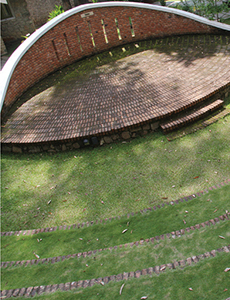The Law
Legal Spotlight

Unhealthy Air Caused Physical Damage
On four nights in July and August, 2013, the Oregon Shakespeare Festival Association cancelled performances at its open-air theater in Ashland. Nearby wildfires impacted air quality and dusted theater surfaces with soot.
 The theater filed a claim with its property insurer, Great American Insurance Co., for loss of business income due to building damage.
The theater filed a claim with its property insurer, Great American Insurance Co., for loss of business income due to building damage.
The insurance company denied the claim, saying there was no physical damage to the property. Therefore, it said, the policy’s business income provisions were not activated.
On June 7, the U.S. District Court for the District of Oregon disagreed.
It rejected the insurer’s argument that damage was not physical, stating that “while air may often be invisible to the naked eye, surely the fact that air has physical properties cannot reasonably be disputed.”
It also rejected the insurance company’s argument that the claim was excluded because the cancellations were voluntary. The court noted the air quality ratings on those days were “unhealthy,” and that a “period of restoration” was needed for repairs, citing the time spent by theater employees changing air filters and cleaning soot and ash from theater surfaces.
Exclusions for smog or pollutants were rejected as well. There was no evidence “any fog or haze … could have combined [with smoke] to create ‘smog,’ ” the court ruled, and the pollutant exclusion did not apply because it related to restoration due to “enforcement of or compliance with any ordinance or law.”
Scorecard: The court ordered the lawsuit to be tried before a jury to determine the amount of damages.
Takeaway: Damage does not always have to be structural or physical if it renders a property unusable.
Title Insurer May Be on Hook for $2.05 Million Claim
In 2005 and 2006, Johnson Bank purchased two title insurance policies from First American Title Insurance Co. in the total amount of $2.05 million for two parcels for which it loaned money to the property owners. The property owners defaulted on their loan to the bank when it was discovered the land could not be developed commercially.
In 2010, the bank purchased the land at a trustee’s sale for $102,000, and a year later, filed a claim against First American because the title insurer had not revealed the commercial development restrictions.
At dispute was the date on which the damage claim should be based — with the value being $2.05 million or $102,000.
Johnson Bank argued it should be the day the title insurance was issued. The insurer said the damages should be based on the value of the properties when they were foreclosed, arguing that a loss is not incurred until the date of the foreclosure (at which point the real estate market had significantly declined).
The policy language was ambiguous as to when the date of loss should be calculated.
A lower court in Arizona ruled in favor of the insurance company. An appeals court reversed that, deciding that because First American “failed to discover and timely disclose” the restrictions on commercial development, the policy was breached when the loans were made.
On appeal, the Supreme Court of the State of Arizona upheld the latter decision on June 13, although it returned the case to a lower court for further proceedings.
“The insurer has complete control of the title defects against which it insures; it is in the best position to avoid such risks and prevent resulting loss by conducting thorough and accurate title searches,” the court ruled.
Scorecard: The title insurance company may be required to pay $2.05 million to the bank.
Takeaway: Allowing the title insurer to use the foreclosure date would allow it to profit from its defective title in a depreciated real estate market.
Insurer Fails to Win New Trial
On March 13, 2010, brothers Amaury and Amed Villa cut a hole in the roof of an Eli Lilly and Co. warehouse and storage facility in Enfield. Conn. They deactivated the security system and stole more than 40 pallets of pharmaceuticals, valued at about $60 million.
 Eventually both men pleaded guilty to the theft, and National Union Fire Insurance Co. paid out more than $42 million in claims to Eli Lilly.
Eventually both men pleaded guilty to the theft, and National Union Fire Insurance Co. paid out more than $42 million in claims to Eli Lilly.
As subrogee, National Union later filed a negligence suit against Tyco Integrated Security, formerly known as ADT Security Services. Tyco provided the security for the warehouse. National Union accused it of failing to warn Eli Lilly of the security system’s failures.
It also failed to tell Eli Lilly about additional thefts, according to the lawsuit, which also claimed that a Tyco employee knew the thieves.
Tyco said that its employee was distantly related and had “little or no interaction” with them.
A jury concluded on April 4, 2016 that Tyco was not negligent in its protection of “confidential details of Eli Lilly’s security” or in failing to warn the company of previous thefts. It found Amaury and Amed Villa each liable in the amount of $10 million.
On June 22, the U.S. District Court for the Southern District of Florida denied the insurance company’s request for a new trial or to amend the verdict.
“On the case presented before the jury, the evidence was sufficient to resolve the matter the way it did in favor of Tyco,” the court ruled.
Scorecard: The imprisoned two brothers were ordered to pay $10 million each to the insurance company, but Tyco will not have to pay any damages.
Takeaway: National Union needed to establish a “manifest injustice” occurred for a new trial to be ordered.










